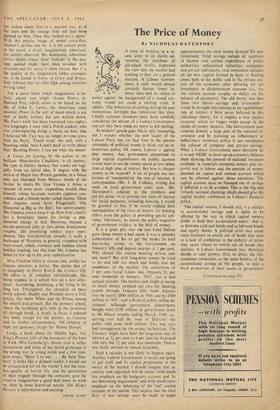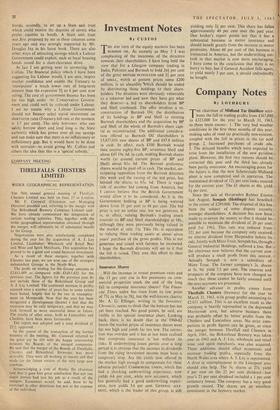The Price of Money
By NICHOLAS DAVENPORT
A mud of brokers, in a re- cent letter to its clients ad- vocating the purchase of gilt-edged stocks, expressed the view that the market had nothing to fear on a general election. A 'Labour Govern- ment, it said, would almost certainly favour lower in- , 0 0 tcrest rates .tind its return to power against the background of a sound eco- mimy would not cause a sterling crisis. it added: 'The behaviour of sterling during the past momentous- fortnight has reinforced this view. Clearly overseas investors must have carefully considered the advent of a Labour Government and yet they have made no move to sell sterling.'
As brokers' gossip goes this is very reassuring, but I wonder whether the new leader of the Labour Party has yet had time in the present crescendo of political events to think out an in- terest-rate policy. Of course, Labour is against dear money. Any government committed to large capital expenditures on public account would want to sec the money raised at low rather than at high rates of interest. But how is cheaper money to be secured? A lot of people arc sus- picious of 'manipulating' the rate of interest. A correspondent (Mr. j. H. Collins), writing last week on local government costs, said: 'Mr. Davenport's solution to the problem. -and , not his alone.-7-is to provide low rates of interest for social purposes, including housing. I would be grateful to him if be would explain how manipulation of the rates of interest for housing differs from the policy of providing special sub- sidies.' Obviously, he shares the public suspicion of government trickery in the field of money.
It is a great pity that the late Lord Dalton gave cheap money a bad name. It was a splendid achievement of his to get the banks to lend day-to-day money to the Goixrnment on Treasury bills and deposit receipts at I per cent. Why should this routine banking service cost any more? But with long-term money he tried to do and talk too much and finally lost the confidence of the market. The conversion of 3 per cent Local Loans into Treasury 21 per cent (undated) in January, 1947, was a bad tactical mistake. The market took fright at seeing so much money pumped out into the banking s) stem through Treasury bills— bank deposits rose by nearly £800 million in 1946 and by £500 million in 1947- --and a flood of public selling de- veloped. Although government departments bought (net) 070 million of government stock in the fifteen months ending March. 1948 • -ac- quiring over half the issue of 'Da lions' the public sold some £630 million. This ■N as very bad management by the money technicians. The Treasury might have held the long-term rate 'of interest at 3:1- per cent to 4 per cent (as Gaitskell told me), but 21 per cent was untenable. Dalton was badly advised to imitate Goschen.
Such a mistake is not likely to happen again. Another Labour Government is surely not going to put itself and its capital programme at the mercy of the market. I should imagine that an entirely new approach will be made---with much less emphasis on the budgetary account and 'its net borrowing requirement' and with much more emphasis on the balancing of the 'real' capital account- of the nation. This implies that the total flow of new savings must be made to equal
approximately the total money demand for new investment. Total savings include all surpluses of income over current expenditure of public authorities, nationalised industries, companies and private individuals; total investment includes all net new capital formed in fixed or floating ' assets both in the public and in the private sec- tors of the econonay—after allowing for net investment or disinvestment overseas (i.e., for the current account surplus or deficit on the balance of payments). The old theory was that these two forces--savings and investment— would be brought into balance at an 'equilibrium' rate of interest. I have never believed in this ridiculous theory, for it implies a free market economy which no longer exists except in the minds of money fanatics. The Government now controls directly a large part of the national in- vestment and by pursuing an inflationary or deflationary monetary policy it can manipulate the volume of company and private savings. What a Labour Government must therefore do, is to ask NE.DC to draw up an economic balance sheet showing the amount of national resources available in materials (domestic output plus mm- ports) and in labour and the amount • of money demand on capital and current account which can be allowed against those resources. The capital account must be financed out of savings if inflation is to be avoided. This is the big step towards national planning which should give the capital market confidence in Labour's financial policy.
The capital market, I should add, is a market in accumulated savings and is liable to be affected by the way in which capital owners prefer to hold their accumulated assets: that is; as between cash and bonds and as between bonds and equity shares. A political crisis may cause some investors to switch out of bonds into cash or a lack of confidence in the stability of prices may cause others to switch out of bonds into equities. A Labour Government may therefore decide to take powers, first, to direct the Re- assurance companies, as the main holders of the accumulated savings of the people, to hold a fixed proportion of their assets in government /Continued on page 32) bonds; secondly, to set up a State unit trust which could receive the deposits of savers who prefer equities to bonds. A State unit trust was ...first proposed by me in these columns some years ago and was strongly supported by Mr. Douglas Jay in his latest book. There are also other ways of attracting savings which a Labour Government could exploit, such as local housing bonds issued for a slum-clearance drive.
At last .1 am getting near to answering Mr. Collins. The financial policy which I have been suggesting for Labour would, I am sure, inspire market confidence and enable the Treasury to 'manipulate' a much lower rate of long-term interest than the expensive 51 to 6 per cent now ruling. The cost ot government finance has been far too high under the Conservative Govern- ment and could well be reduced under Labour. I see no reason why a Labour Government should not finance select social investment on short-term rates (Treasury bill rate at the moment is 3.7 per cent). The only borrower who can safely borrow short and lend long is the State authority which has power over all our savings and can make sure that there is no inflationary or deflationary gap. But it would have to be done with restraint-7-to. avoid giving Mr. Collins and others the idea that this is a 'special subsidy.' .







































 Previous page
Previous page